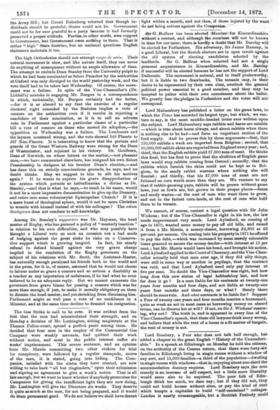We cannot, of course, contest a legal question with Sir
John, Wickens ; but if the Vice-Chancellor is right in his law, the law needs improvement very much. Lord Aylesford, on coining of age in 1870, wanted some money to pay off old bills, and raised it from a Mr. Morris, a money-dealer, borrowing £6,800 at 60 per cent. per annum. On coming into his property in 1871 he offered to pay the debt, —which was increased by some merely colourable loans granted to secure the money-lender—with interest at 15 per cent. ; but Mr. Morris would have his bond, and brought his action. Lord Aylesford applied to the Court of Chancery, and the Vice-Chan- cellor actually held that men over age, if they did silly things, were still in some way or another in pupilage, that the contract was void, and that Lord Aylesford need only pay interest at five per cent. No doubt the Vice-Chancellor was right, but how long does this new status of legal hobbedehoy last, and how far does it go ? Is a man liable for his contracts at twenty-one years four months and four days, and not liable at twenty-one years four months and three days, or what ? Surely there should be some rule. And what contracts is he liable for ? Suppose a Peer of twenty-one years and fonr months marries a housemaid, quite as weak an act in most cases as borrowing money on absurd terms, can he divorce her at will? If not, on Sir J. Wickens' reason- ing, why not? The truth is, and is apparent in every line of the Vice-Chancellor's speech, that these old lawyers think usury wrong, and believe that while the rent of a house is a fit matter of bargain, the rent of money is not.










































 Previous page
Previous page